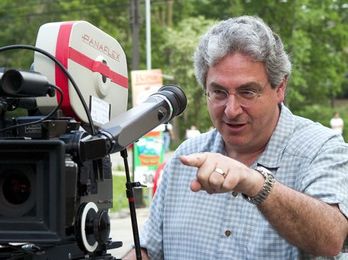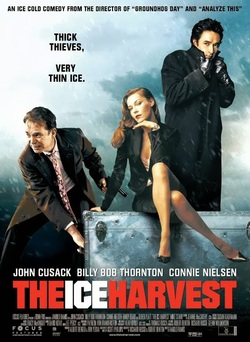
It got me thinking that when he does pass, I’ll have to post the transcripts of my interviews with him. It never occurred to me I'd soon be digging out an interview I did with writer/director/actor Harold Ramis, who died today at the age of 69.
It would’ve been nice if I’d gotten to talk to Ramis about, say, his early days at Second City or what it was like to work with John Belushi on “Animal House.” But when I interviewed him in 2004, it was for an article in The Hollywood Reporter about “runaway production,” so we discussed who he had to bluh… I mean, what he had to do to shoot his big screen adaptation of the Scott Phillips novel The Ice Harvest, starring John Cusack and Billy Bob Thornton, in his native Chicago instead of Canada, as was de rigueur at the time.
Longwell: Why are you filming in Chicago as opposed to, say, Toronto?
Ramis: Because we’re Americans, goddammit! We’ve had enough! (laughs)

Longwell: Was it hard sell to the studio, Focus Features?
Ramis: It has not been, oddly enough. In this case, I simply said… This is really for selfish reasons, because I grew up in Chicago and moved back here eight years ago. I’d lived in L.A. for 20 years. In the 8 years I’ve been here, the last three films I’ve done, two were in New York and one was in L.A., so I thought I really want to work at home for a change. So I kind of made it a condition of my next employment that I would only shoot in Chicago, and that was kind of well known among the studios, and most of the projects that I was offered always came with the note “We’d be happy to work in Chicago on this.” So I kind of knew my next film would be here. We had a bit of a… not a fight, but a struggle to get the budget on “Ice Harvest” down to the point where we could match the Canadian budget, because Focus had drawn a pretty hard line on the budget.
Longwell: They must’ve been happy with the incentives.
Ramis: Well, that’s what made the difference. I don’t think Focus cared how we did it, but it was really a combination of great cooperation from the state, the tax bill that passed this year and some help from the unions that was really useful. The state can provide some facilities and stuff. I guess that all the states are doing that now – all the ones that are serious about attracting film production.
Longwell: What did the unions do for you?
Ramis: The unions can do things like extend the (30-mile) zone, for instance. I don’t know how far our zone goes in Chicago, exactly. But if you’re going to shoot a few miles outside the zone, they can still treat it as local and not pay per diem and board on everybody.
Longwell: It didn’t hurt having a star (Cusack) who is a passionate Chicagoan.
Ramis: John was happy to work here. But you talk to anyone who’s worked in Chicago and they’ll all tell you they really like it. It’s a real good city and we have real good crews. All the technical stuff is great. The city is pretty cooperative. It might as well be here.
Longwell: How do feel when you see Chicago played by Toronto? I imagine it happens pretty frequently?
Ramis: It happens with New York, too. Both “Ghostbusters” were set in New York, but we shot two shot two weeks in New York on each film and the rest was done in L.A. It happens all the time. With “Analyze This” and “Analyze That,” both Robert DeNiro and Bill Crystal, who functioned as executive producers on the movies, were intent that it be New York and only New York, so we were 100% New York and New Jersey-based on those movies.
Longwell: Do you think audiences notice when they’re not?
Ramis: I don’t think they know, but if you’re a filmmaker and you’re watching for it… I pretty much know when I’m on a stage and I can pretty much tell when I’m on a backlot, and if it’s a city I know well, I can start guessing which shots were done elsewhere.
Longwell: Portions of the movie “Seed of Chucky” are set on the Universal Studios backlot, but they’re shooting it in Romania.
Ramis: That’s too ironic. That’s insane. It’s amazing that the Czech Republic was the place to go, that Prague became such a film center because of the savings and now Prague will lose business to Romania. And when Romania is too expensive, people will go to Albania, I suppose. We’ve watched the same pattern in the animation business as it’s traveled around the world. And the same thing will happen in the film business.

 RSS Feed
RSS Feed
